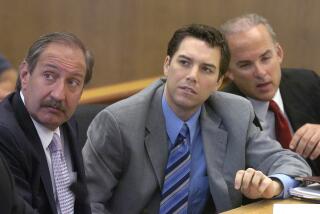Lisker Agrees to Waive Parole Hearing
- Share via
A San Fernando Valley man who claims he was wrongly convicted of murdering his mother more than 20 years ago agreed Monday to waive a scheduled parole hearing for up to one year while he seeks to overturn his conviction in federal court.
Bruce Lisker, who is serving a life sentence for the March 10, 1983, murder of his mother, Dorka, agreed to the waiver because he was concerned that officials would be inclined to deny his parole if he did not accept responsibility for the crime and show remorse, according to his attorney, Vicki Podberesky.
Although Lisker has amassed significant evidence casting doubt on his guilt, parole officials cannot consider new evidence in the case and are required by law to assume that a prisoner is guilty of the crime.
“We’re not here to retry the case,” said Terry Farmer, a Board of Prison Terms commissioner who would have presided over the hearing at Mule Creek State Prison, where Lisker is serving his sentence.
Under a deal worked out by Podberesky, Lisker would be able to immediately request a parole hearing within the year should his bid to overturn his conviction in federal court gain momentum.
Had Lisker, 40, proceeded with the parole hearing and been denied, he risked not having his case reconsidered for up to five years, his attorney said.
A judge is considering whether Lisker has presented sufficient evidence of his innocence to be allowed to go forward with his habeas corpus petition.
Today, much of the original case against Lisker has been discredited by new or previously overlooked evidence.
One of the most notable evidentiary problems for authorities opposing his petition involves a bloody shoeprint found in a bathroom of the Lisker family’s Sherman Oaks home.
At Lisker’s trial, authorities said the print came from Lisker’s shoes and was strong evidence of his guilt. If his mother had been killed by an intruder, as Lisker claimed, another person’s shoeprint would have been found, the prosecutor told jurors. Only Lisker’s shoeprint, the prosecutor said, was found at the crime scene.
But crime scene photographs recently analyzed by both the Los Angeles Police Department and the FBI have established that the bloody print did not come from Lisker’s shoe, strongly suggesting that someone else had been at the scene.
Furthermore, the LAPD has determined that an apparent shoe impression on Dorka Lisker’s head, visible in an old coroner’s photograph, did not come from Lisker’s shoe, but was “similar in size and dimension” to the mystery print found in the bathroom.
Over the years, Lisker has confessed several times to the crime.
He now says those confessions were desperate attempts to minimize his time behind bars, and he stands by the story he told police on the day of the slaying: that he came home, found his mother’s body and immediately called paramedics for help.
More to Read
Sign up for Essential California
The most important California stories and recommendations in your inbox every morning.
You may occasionally receive promotional content from the Los Angeles Times.














